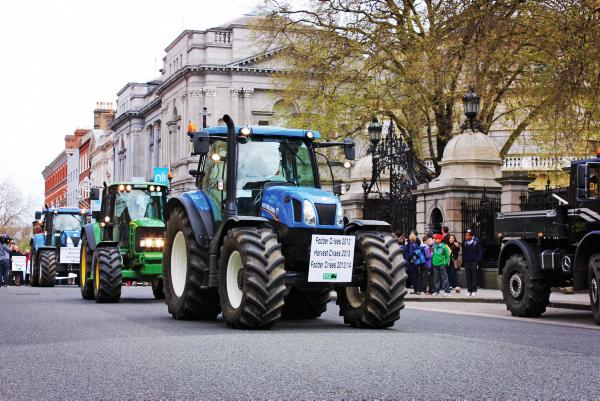The Farm Contractors Association of Ireland (FCI) used the support of their European counterparts at CEETTAR to urge the Minister for Finance to remove the Carbon Tax on tractor diesel, and to support moves at a taxation level to develop a level playing field for tax-compliant agricultural contractors.
Over 100 agricultural contractors from all corners of the country took part in the protest which was addressed by Timmy O’Brien, chairman, and Peter Farrelly, secretary FCI, along with TDs Mattie McGrath, Timmy Dooley and Michael Healy-Rae.
They heard calls of support for the FCI demands in order to protect contracting jobs in rural areas and to ensure the delivery of the ambitious Food Harvest 2020 projections.
TD Mattie McGrath said that he had lobbied for contractors to get the Carbon Tax rebate in the same way that farmers and, more recently, road haulage and bus contractors received the rebate. He said that the country needs a full fleet of agricultural contractor machines to meet the targets of Harvest 2020. He also said that the hard work of FCI needs to be better recognised by IFA.
Fianna Fail TD Timmy Dooley told the contractors that he regretted the introduction of the Carbon Tax, it was making contracting unviable for many rural businesses and its abolition needs to be addressed, he added.
“Carbon tax has been damaging the efforts of Irish farming in achieving the Harvest 2020 targets and I deeply regret its introduction,” he said.
European support
French-based president of European Contractors Association (CEETTAR) Gerard Napias sent a letter of support to the Ministers for Agriculture and Finance to encourage change to help contractors to survive in what have been two very difficult years.
He wrote, in a letter to both Ministers: “The disastrous impact that black economy operators are having on farm contractors, as well as on the economic situation in Ireland, is well known and well documented. Such impact should not be overlooked. Firstly, because it deprives your government of much-needed revenues in a period of financial downturn, secondly, because it jeopardises the achievement of the CAP goals for a competitive and sustainable European agriculture.”






 This is a subscriber-only article
This is a subscriber-only article










SHARING OPTIONS: